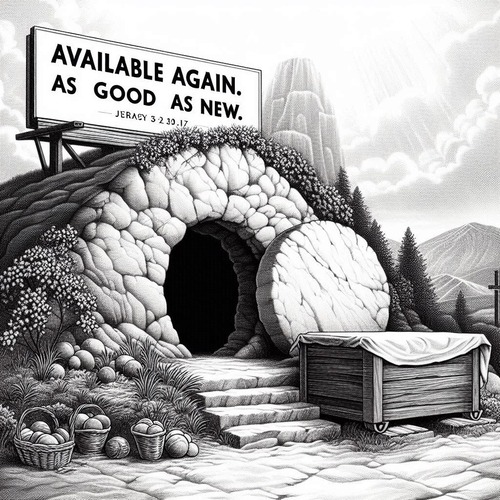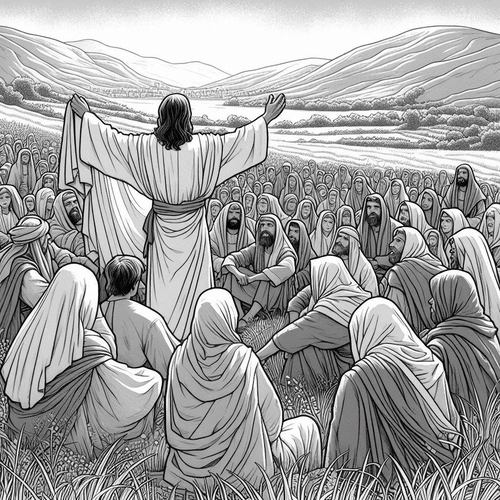John 14:12: What Does Jesus Mean by ‘Greater Works Than These’?
“Truly, truly, I say to you, whoever believes in me will also do the works that I do; and greater works than these will he do, because I am going to the Father.” These words of Jesus, recorded in John 14:12, have puzzled many throughout church history.
How could Jesus claim His followers would do greater works than His own miraculous ministry? Join us as we carefully examine this seeming paradox particularly through the lens of Reformed theology’s rich interpretive tradition.
THE HISTORICAL CONTEXT
Before we seek to interpret the passage, let’s first consider the setting: Jesus’s farewell discourse to His disciples. Christ is speaking these words on the night before His crucifixion, as He prepares His followers for His departure. The context is crucial—Jesus isn’t merely making a general promise about miraculous powers. He’s explaining how His physical absence would, paradoxically, lead to an expansion of His kingdom’s influence through the Spirit-empowered church.
The immediate audience consists of the disciples, who’d become apostles. The promise, however, extends to “whoever believes in me.” This universal scope suggests the prophecy has a broader application beyond the apostolic age, though perhaps in a manner different from what many expect…
REFORMED UNDERSTANDING OF “GREATER WORKS”
Quantitative vs. Qualitative Interpretation
The “greater works” Jesus promised do not refer to mere impressive displays of power. Indeed, come to think of it: how could any work be greater than what Jesus Himself was doing—such as raising the dead or feeding thousands? Instead, these works are “greater” in their scope and extent—the multiplication of Christ’s ministry through His church across the globe and throughout history.
Key Reformed Interpretations
The Reformed tradition has consistently understood Christ’s promise of “greater works” within the framework of His ascension and the sending of the Spirit. Charles Hodge, in his Systematic Theology, explains these “greater works” refer primarily to the spiritual victories of the gospel: “The works which the apostles wrought were greater in number, in extent of influence, and in their spiritual effects than those wrought by Christ Himself during His earthly ministry.”
BB Warfield develops this interpretation further in his work “Counterfeit Miracles,” arguing the “greater works” promise finds its fulfillment not in more spectacular miracles, but in the broader reach of Christ’s kingdom through His church. The conversion of thousands on Pentecost, the spread of the gospel throughout the Roman Empire, and the continuing expansion of Christ’s church demonstrate these “greater works.”
We shall do well to remember, however, that Christ remains the primary actor. We, His people, are mere instruments through whom He works. Individual believers don’t perform more impressive miracles than Christ did; rather, the collective ministry of Christ’s church extends His work globally. While Jesus’s earthly ministry was necessarily limited to Palestine and lasted only three years, His work through the church reaches every nation and continues through the ages.
WHY WE DON’T SEE IDENTICAL MIRACLES TODAY
Reformed Understanding of Miracles
Reformed theology distinguishes between the extraordinary signs of the apostolic age and the ordinary means of grace in the church age. The miraculous signs served to authenticate the apostolic message and the inauguration of the new covenant. With the completion of Scripture and the establishment of the church, these extraordinary signs have largely ceased, though God remains free to work as He chooses.
The Nature of “Greater Works”
The truly “greater works” Jesus promised primarily involve spiritual transformation through the gospel. While Jesus healed bodies and fed multitudes during His earthly ministry, the church proclaims a message that brings eternal life and spiritual renewal. Consider Peter’s sermon at Pentecost—three thousand souls were converted in a single day, more than we see during Jesus’s earthly ministry.
This spiritual focus aligns with the whole trajectory of Jesus’s teaching. Even His physical miracles pointed to spiritual realities—healing the blind illustrated spiritual enlightenment, raising the dead foreshadowed spiritual resurrection, feeding the multitudes anticipated the bread of life.
CONTEMPORARY APPLICATION
- How Modern Believers Participate in “Greater Works”: Today’s believers participate in these “greater works” primarily through faithful gospel ministry. When we proclaim Christ’s finished work, the Spirit brings dead sinners to life. When we make disciples, we participate in expanding Christ’s kingdom. When we plant churches, we establish outposts of His reign in new territories.
- Proper Understanding of Our Role: Our role in these ‘greater works’ requires complete dependence on Christ. Jesus prefaced this promise by emphasising faith in Him, and followed it up by stressing prayer in His name. We’re instruments through whom He works, not independent agents. The power remains His; the glory belongs to Him alone.
CONCLUSION
Jesus’s promise in John 14:12 finds its fulfillment not in individual believers performing greater miracles than Christ, but in the Spirit-empowered church extending Christ’s work throughout the world. Through ordinary means—the preaching of the Word, the administration of the sacraments, prayer, and discipleship—Christ continues to work in and through His people.
This understanding preserves Christ’s unique glory while explaining how His work expands through His church. It encourages faithful ministry through ordained means rather than seeking extraordinary signs. Most importantly, it reminds us Christ Himself remains the worker, and we are privileged instruments in His ongoing work of redemption.
Greater Works Than These: Related FAQs
Is our interpretation the consensus view in Reformed circles? There is broad consensus in Reformed theology about the core interpretation: that the “greater works” primarily refer to the Spirit-empowered spread of the gospel and conversion of sinners, rather than more spectacular individual miracles. The emphasis on Christ working through His church collectively, rather than individual believers performing greater miracles, is widely accepted.
However, there are variations among Reformed theologians regarding the details, particularly concerning the continuation of miraculous gifts and the exact scope of application. While Cessationists and Continuationists within Reformed circles differ on secondary aspects, they generally agree on the primary fulfillment being in the advance of Christ’s kingdom through gospel proclamation.
Does John 14:12 mean believers should expect to perform miracles like Jesus did? From a Reformed perspective, this verse isn’t primarily about performing similar physical miracles. The focus is on the broader spread of the gospel and spiritual transformation through the church’s ministry. While God remains sovereign and can work miracles as He chooses, the emphasis is on the ordinary means of grace and the Spirit’s work through gospel proclamation.
How should we respond to claims that all believers should be performing miraculous healings based on this verse? Such claims misunderstand both the nature of Christ’s promise and its primary fulfillment. The “greater works” primarily refer to the Spirit-empowered spread of the gospel and conversion of sinners, which is actually more miraculous than physical healing. The focus should be on faithful gospel ministry rather than seeking spectacular signs.
What’s wrong with the prosperity gospel interpretation of this verse? The prosperity gospel misreads this verse by focusing on material and physical manifestations rather than spiritual transformation. It inappropriately makes individual believers the focus rather than Christ working through His church, and it often neglects the crucial context of Christ’s ascension and the sending of the Spirit.
If we’re supposed to do “greater works,” why does the church seem less powerful than in New Testament times? This question assumes that visible miracles are the primary measure of spiritual power. The conversion of sinners, transformation of lives, and global spread of the gospel represent greater spiritual power than physical miracles. The church today has reached far more people with the gospel than in the New Testament era.
What’s the relationship between this promise and modern missions? This promise finds direct fulfillment in the global missionary enterprise. The geographic and numerical expansion of Christ’s kingdom through missions demonstrates these “greater works,” as the gospel reaches peoples and places far beyond Jesus’s earthly ministry.
How do we explain this verse to those influenced by charismatic teaching? We should affirm God’s continuing power while emphasising the primary fulfillment of this promise is in gospel proclamation and spiritual transformation. The focus should be redirected from seeking individual spectacular experiences to participating in Christ’s work through His church.
Greater Works Than These: Our Related Posts
Editor's Pick

Why Do People Hate the Doctrine of Election?
…WHEN THEY REALLY SHOULDN’T Few Bible doctrines provoke stronger reactions than election. The idea that God chose some for salvation [...]

The Doctrine of Providence: Does God Really Govern All Things?
You’re sitting in the doctor’s office when the diagnosis lands like a thunderclap. Your mind races: Why this? Why now? [...]

No Decay, No Defeat: What It Means That Christ’s Body Saw No Corruption
On the Day of Pentecost, Peter stood before thousands and made a startling claim: David's body decayed in the tomb, [...]
SUPPORT US:
Feel the Holy Spirit's gentle nudge to partner with us?
Donate Online:
Account Name: TRUTHS TO DIE FOR FOUNDATION
Account Number: 10243565459
Bank IFSC: IDFB0043391
Bank Name: IDFC FIRST BANK






